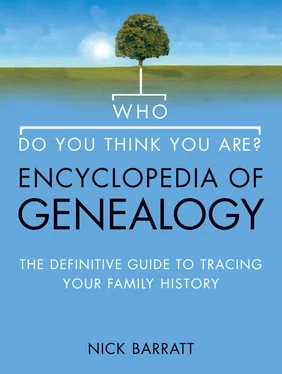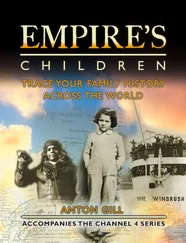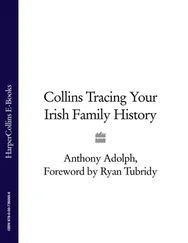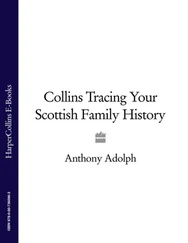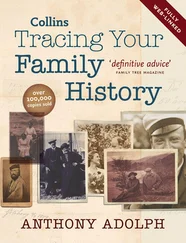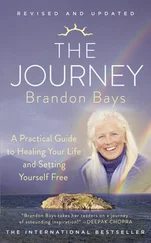The archival pyramid:
National and specialist collections
Municipal or county archives (area administrative records)
Local studies centres (general material)
Your initial investigations within your family will have already generated both primary evidence, in the form of documents, photos and letters found around the house, and secondary material from relatives in the form of anecdotes told to them by their ancestors. The next task is to find additional primary and secondary material to extend your family tree. Once this is done, you can then proceed to a wider search for information that will place your relatives in their historical context. It is time to turn to record offices, libraries and museums.
Where to Look for Evidence: Archives, Record Offices, Libraries and Museums
What is an Archive?
The majority of primary material will be housed in record offices, libraries and museums, scattered across Britain – or, if your ancestors came from overseas, all around the world. Many people loosely refer to these institutions as ‘archives’. Although this isn’t the place for academic debate, in technical terms an archive is actually a collection of documents, manuscripts or other primary evidence, although the term is more often used to describe the building or institution in which the collection is housed. It is in this context that the word ‘archive’ will be used in this book.
For those of you who have never been to an archive before, it can be a daunting experience, but one well worth undertaking. Each archive is unique, will hold a different variety of records, and will have its own way of collecting, storing, cataloguing and indexing its records. Bearing in mind that information about your ancestors could turn up anywhere, the first step of your research strategy should be to work out which archives are going to be of most use to you first. The following notes should help you do this, but don’t forget that you will probably need to visit more than one archive over the course of your research, and will often have to return to the same archive many times.
There is a rough hierarchy to archives, ranging from general material held at local studies centres, via the administrative records of a municipal area or county, to national and specialist collections. It is advisable to start at the bottom of this archival pyramid first, and begin by looking for information at a local studies centre. These are often located in a local library, and hold records relating to the immediate area, which may cover a few towns and villages, or all the places situated within a borough. These records can include newspaper collections, rate books, electoral registers, trade directories, photographic material and private family papers deposited by local gentry, as well as maps and plans of the area. You will also find secondary sources here, such as histories of the local area, and if you are really lucky you may also find national collections – indexes to birth, marriage and death certificates, or census returns – on microfilm or microfiche.
The amount of material held varies greatly from one local studies centre to another. Some hold vast amounts of primary material while others are less well stocked. Therefore it is worthwhile contacting your local studies centre beforehand to enquire exactly what type of records they hold. If your ancestors did not live locally to where you now live, you will need to visit a local studies centre near the place they were from. Geography is very important to pinpoint the archives you need to visit.
‘If your ancestors did not live locally to where you now live, you will need to visit a local studies centre near the place they were from.’
If you do not have a local studies centre in your area, then you may want to see if the Church of Jesus Christ of Latter Day Saints (LDS) have set up a Family History Centre in the vicinity. The LDS Church is an American organization founded by the Mormons in Utah. It has been collecting genealogical records from around the world for the last century, depositing them at its Family History Library in Salt Lake City. There are many Family History Centres around the British Isles and the rest of the world where duplicate copies of many of their central records are held, ranging from parish registers to ancestral files deposited by other researchers. You can find your local Family History Centre from the www.familysearch.org website by entering a country of interest in the Find a Family History Centre Near Your Home search box and then scrolling through the alphabetical list of places for that country.
In the hierarchical structure of archives, county record offices (CROs) are the next port of call. As the title suggests, a county record office is a central repository for administrative documents relating to the county, and each county has at least one. (Some have more than one, like Devon, which has three; the Devon Record Office in Exeter, the North Devon Record Office in Barnstaple and the Plymouth and West Devon Record Office in Plymouth.)
In general, most CROs hold census returns, rate books, electoral registers, trade directories, photos and prints, local government documents, maps, parish registers, civil registration indexes, private company and family papers and local history books for every place within the county (rather than just a few towns and villages covered by a local studies centre). In some cases a CRO will store duplicate copies of material held by local study centres, but in other areas the two types of repository will hold completely different sets of records on any given place within that county. It is always worth visiting the local studies centre and the CRO for the area in which you are researching, because there is bound to be at least something extra you will find in the CRO.
Of particular importance are the records deposited by locally important families, who historically would have owned much of the land within the county and therefore played an important part in your ancestors’ lives. Their estate records, rent books, employment accounts, correspondence and records as local justices of the peace will contain thousands of names, many of which may be relevant to you and your search. However, it’s worth remembering that especially wealthy families owned land in more than one county – so if you can’t find what you are looking for in one CRO, it might be worth checking to see if important family papers for principal landowners are deposited elsewhere, possibly in another county where they had their main residence.
If your ancestors lived on the border of a county you should investigate whether the county borders have changed at any time. For example, Bredon’s Hardwick, now in Gloucestershire, was for many centuries described as being in Worcestershire. As a result, some records for people who have lived in Bredon’s Hardwick are located in Worcestershire Record Office, while other records are held in the Gloucestershire Archives. Equally, if your ancestors lived on the border of one or more counties they may have moved around and spent time living on both sides of the boundary at various times, in which case there is probably material about them to be found in the record offices for both those counties.
It is also worth considering the collections of major cities, which are often stored in their own municipal record offices or archives. Many places have more than one institution for you to visit. For example, London is served by the London Metropolitan Archives, the Corporation of London Record Office and the Guildhall Library, each of which holds important historical and genealogical information.
Читать дальше
